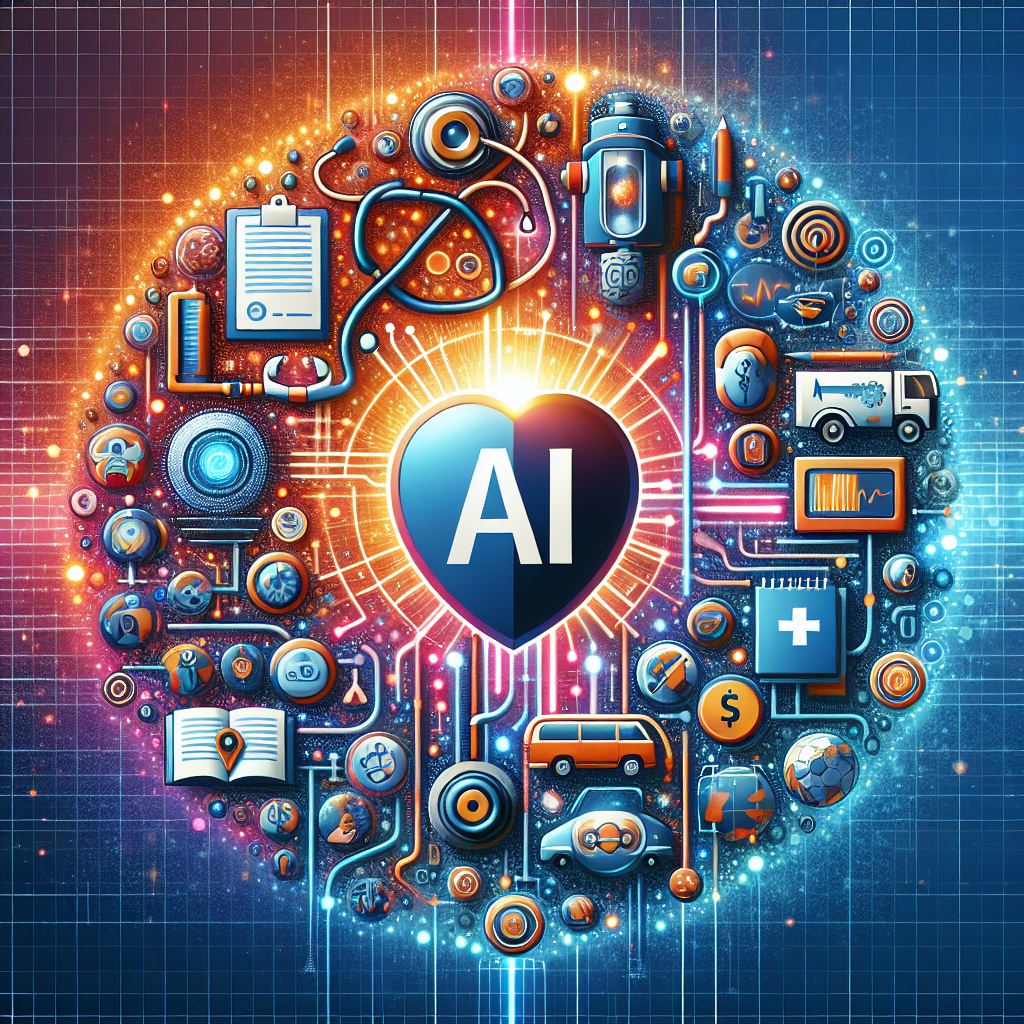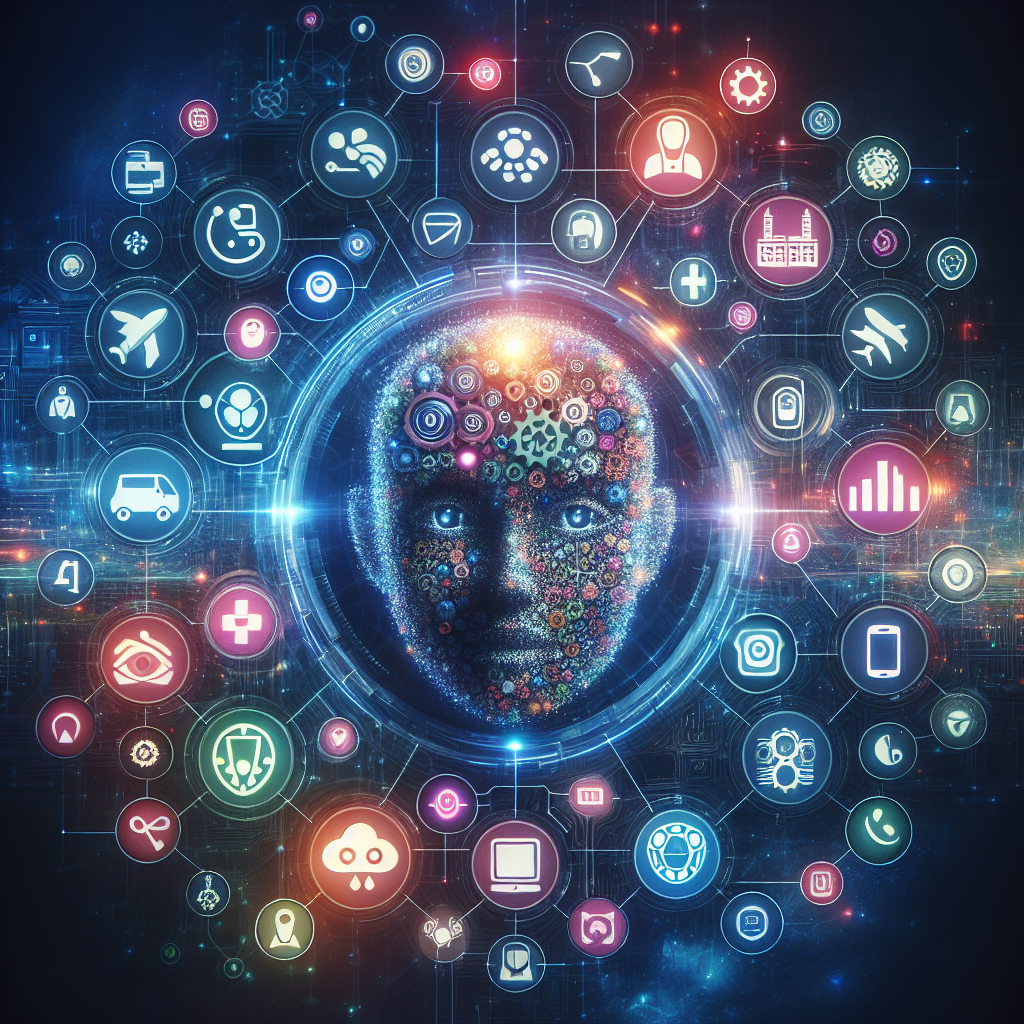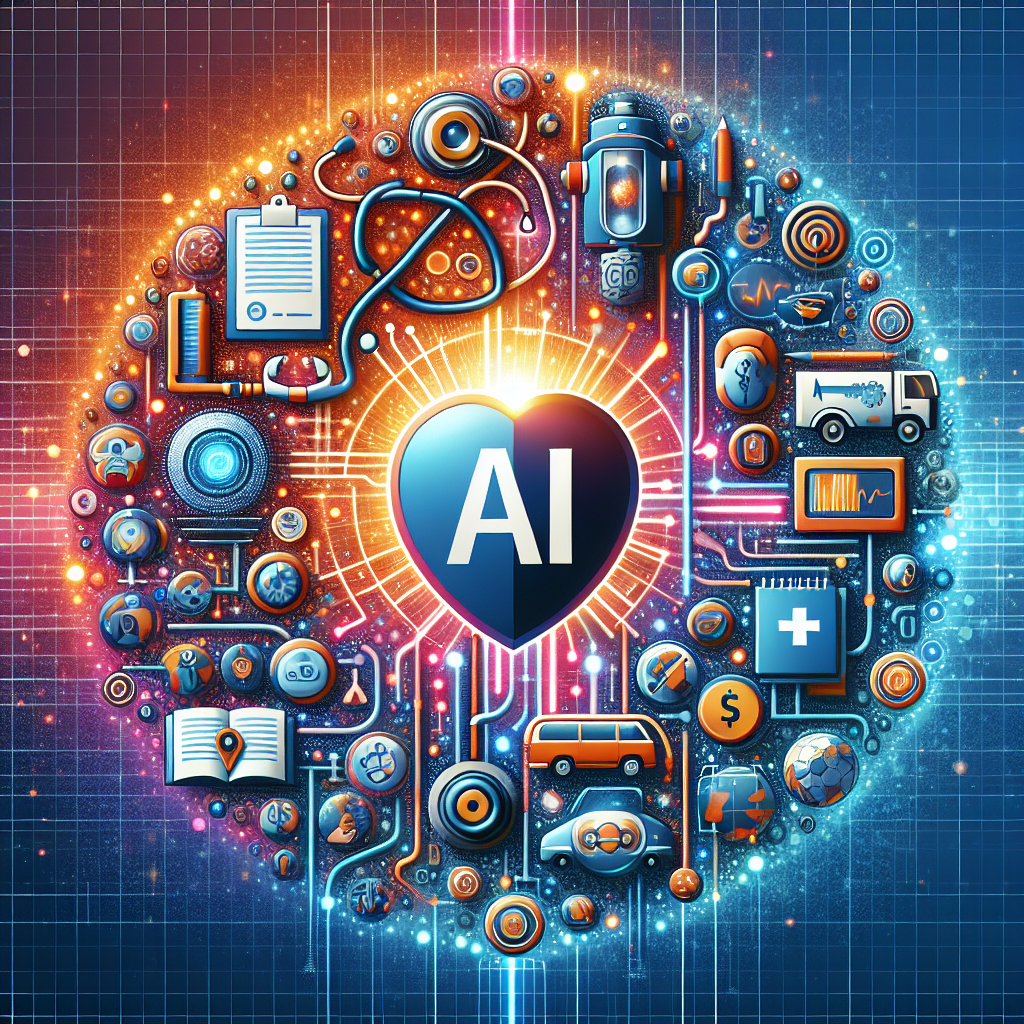Imagine a world where technology is not only advancing but also opening up new and exciting opportunities. Well, that world exists, and it’s being shaped by the incredible potential of Artificial Intelligence (AI). From healthcare to agriculture to transportation, AI has the potential to revolutionize numerous industries, paving the way for unprecedented growth and innovation. In this article, we will explore some of the promising fields that AI can open up, sparking your imagination and showcasing the endless possibilities that lie ahead. So, let’s embark on this journey together and uncover the vast potential of AI in shaping our future.
Healthcare
Artificial intelligence (AI) has the potential to revolutionize the healthcare industry by improving diagnostics, drug discovery, and patient care. In the field of diagnostics, AI can analyze medical images such as X-rays, CT scans, and MRIs to detect abnormalities and assist radiologists in making accurate diagnoses. By leveraging machine learning algorithms, AI can learn from vast amounts of data and provide more accurate and timely diagnoses, leading to improved patient outcomes.
In drug discovery, AI can significantly expedite the process of developing new medications. With the ability to analyze massive amounts of data and identify patterns, AI algorithms can predict the efficacy and safety of potential drug candidates. This can help researchers prioritize the most promising compounds and reduce the time and resources required for clinical trials. AI can also contribute to personalized medicine by analyzing patient data and recommending tailored treatment plans based on individual genetic profiles and medical history.
When it comes to patient care, AI-powered systems can enhance communication between healthcare providers and patients. Chatbots and virtual assistants can provide immediate and accurate information about symptoms, treatments, and medications, easing the burden on healthcare professionals and empowering patients to make informed decisions about their health. AI can also help monitor patients remotely, enabling early detection of health issues and reducing the need for frequent hospital visits.
Transportation
AI has the potential to revolutionize the transportation industry, particularly in the areas of autonomous vehicles, traffic management, and logistics and delivery. Autonomous vehicles, which rely on AI algorithms to perceive and navigate their surroundings, have the potential to significantly reduce accidents and increase the efficiency of transportation systems. By eliminating human error and enabling vehicles to communicate with each other, AI can optimize traffic flow, reduce congestion, and improve overall road safety.
In addition to autonomous vehicles, AI can also improve traffic management by analyzing real-time data from various sources, such as traffic cameras, sensors, and GPS. By leveraging this data, AI algorithms can predict and react to traffic patterns, optimizing traffic signal timings and suggesting alternative routes to minimize congestion. AI can also play a crucial role in logistics and delivery by optimizing delivery routes, predicting demand, and enabling real-time tracking of packages, leading to faster and more efficient delivery services.

Education
AI has the potential to transform education by enhancing personalized learning, intelligent tutoring, and educational content creation. Personalized learning, enabled by AI, can adapt educational materials and teaching methods to meet the needs and learning styles of individual students. By analyzing student data, AI algorithms can identify areas of strengths and weaknesses, provide targeted feedback, and recommend customized learning resources. This can enable students to learn at their own pace and maximize their academic potential.
Intelligent tutoring systems powered by AI can provide personalized and interactive learning experiences. By analyzing student responses and providing immediate feedback, AI tutors can help students grasp complex concepts and reinforce learning through adaptive exercises. These systems can also track student progress and identify areas that require additional attention, enabling educators to provide targeted support and intervention when needed.
Furthermore, AI can contribute to educational content creation by automating the generation of educational materials. Natural language processing algorithms can analyze existing resources, such as textbooks and research papers, and extract relevant information to create interactive and dynamic learning materials. This not only reduces the time and effort required for content creation but also ensures that content remains up-to-date and aligns with current knowledge and research.
Finance
AI has the potential to transform the finance industry by improving fraud detection, investment management, and customer service. In fraud detection, AI-powered algorithms can analyze large volumes of financial data to identify patterns and anomalies indicative of fraudulent activities. By constantly learning from new data, AI can adapt and improve its ability to detect fraud, helping financial institutions protect their customers’ assets and prevent financial crimes.
In investment management, AI algorithms can analyze vast amounts of financial data, market trends, and news to make data-driven investment decisions. By identifying patterns and predicting market movements, AI can assist investment professionals in making informed decisions and optimizing portfolio performance. These algorithms can also provide personalized investment recommendations based on individual risk preferences and financial goals, enabling individuals to make sound investment choices.
AI can also enhance customer service in the finance industry. Chatbots and virtual assistants can provide immediate and accurate responses to customer inquiries, improving overall customer experience and reducing the need for human intervention. AI-powered systems can analyze customer data and provide personalized financial advice, such as budgeting tips and investment suggestions, based on individual financial situations and goals. This can empower customers to make informed financial decisions and improve their financial well-being.

Agriculture
AI has the potential to revolutionize the agricultural industry by improving precision farming, crop yield optimization, and livestock monitoring. In precision farming, AI algorithms can analyze data from various sources, such as satellite imagery, weather forecasts, and soil sensors, to provide farmers with real-time insights into crop health, irrigation needs, and pest infestations. By enabling targeted interventions, such as precise application of pesticides and fertilizers, AI can optimize crop production, reduce resource wastage, and minimize environmental impact.
Crop yield optimization is another area where AI can make a significant impact. By analyzing historical and real-time data, such as weather patterns, soil conditions, and plant genetics, AI algorithms can predict optimal planting times, irrigation schedules, and harvesting techniques. This can help farmers maximize crop yields, minimize losses, and ensure food security in an increasingly unpredictable climate.
Livestock monitoring is yet another area where AI can play a crucial role. By using sensors and AI-powered algorithms, farmers can continuously monitor the health and well-being of their livestock. AI can detect early signs of illness, optimize feeding and breeding schedules, and provide insights into animal behavior and welfare. This can help farmers improve animal health, reduce mortality rates, and increase the efficiency of livestock production.
Energy
AI has the potential to transform the energy sector by improving smart grid management, energy demand forecasting, and renewable energy optimization. In smart grid management, AI algorithms can analyze real-time data from power grids to optimize electricity generation, distribution, and consumption. By predicting demand patterns, detecting anomalies, and adjusting energy supply accordingly, AI can enhance grid stability and efficiency, leading to reduced energy wastage and cost savings.
Energy demand forecasting is another area where AI can make a significant impact. By analyzing historical consumption data, weather patterns, and socio-economic factors, AI algorithms can predict future energy demand with high accuracy. This enables energy providers to optimize energy generation and distribution, ensuring a reliable and sustainable energy supply. AI can also contribute to load balancing by incentivizing consumers to shift their energy usage to off-peak hours, reducing the strain on the grid during peak demand periods.
Renewable energy optimization is a critical area where AI can help maximize the utilization of renewable energy sources, such as solar and wind. By analyzing weather forecasts, energy production data, and grid constraints, AI algorithms can optimize the deployment and operation of renewable energy systems. This can help increase the penetration of renewable energy, reduce reliance on fossil fuels, and mitigate environmental impact.
Retail
AI has the potential to transform the retail industry by improving inventory management, customer behavior analysis, and supply chain optimization. In inventory management, AI algorithms can analyze historical sales data, demand patterns, and customer preferences to predict future demand and optimize inventory levels. By ensuring the availability of products when and where customers need them, AI can reduce stockouts, minimize excess inventory, and improve overall customer satisfaction.
Customer behavior analysis is another area where AI can make a significant impact in retail. By analyzing customer data from various sources, such as purchase history, browsing behavior, and social media interactions, AI algorithms can gain insights into customer preferences, purchase intent, and loyalty. This enables retailers to personalize marketing efforts, recommend relevant products, and provide targeted promotions, enhancing the overall shopping experience and increasing customer loyalty.
Supply chain optimization is yet another area where AI can contribute to the retail industry. By analyzing data from various supply chain components, such as suppliers, warehouses, and transportation routes, AI algorithms can identify inefficiencies, bottlenecks, and risks in the supply chain. This enables retailers to optimize inventory replenishment, reduce transportation costs, and streamline overall supply chain operations, leading to improved efficiency and cost savings.
Manufacturing
AI has the potential to transform the manufacturing industry by improving quality control, predictive maintenance, and supply chain management. In quality control, AI-powered systems can analyze real-time data from sensors and production lines to detect anomalies, identify defective products, and optimize product quality. By automating the inspection process and reducing human error, AI can improve product consistency and reliability, leading to higher customer satisfaction.
Predictive maintenance is another area where AI can make a significant impact in manufacturing. By analyzing real-time sensor data, historical maintenance records, and machine learning algorithms, AI can predict equipment failures before they occur. This enables manufacturers to schedule maintenance activities proactively, reduce downtime, and optimize maintenance costs. Predictive maintenance can also extend the lifespan of equipment and prevent costly production disruptions.
Supply chain management is yet another area where AI can revolutionize the manufacturing industry. By analyzing data from various supply chain components, such as suppliers, transportation routes, and demand forecasts, AI algorithms can optimize inventory levels, minimize transportation costs, and improve overall supply chain efficiency. This enables manufacturers to meet customer demand more effectively, reduce lead times, and improve overall operational performance.
Entertainment
AI has the potential to transform the entertainment industry by improving content recommendation, virtual reality experiences, and natural language processing. In content recommendation, AI algorithms can analyze user preferences, behavior patterns, and content metadata to provide personalized recommendations for movies, TV shows, music, and other forms of entertainment. By understanding individual tastes and preferences, AI can curate content that is more likely to resonate with users, leading to increased engagement and customer satisfaction.
Virtual reality (VR) experiences can also be enhanced with the help of AI. AI algorithms can analyze user interactions, facial expressions, and physiological responses in real-time, enabling immersive and interactive VR experiences. By adapting content based on user feedback and preferences, AI can create personalized and engaging VR experiences that make users feel like active participants in virtual worlds.
Natural language processing (NLP) is another area where AI can make a significant impact in the entertainment industry. NLP algorithms can analyze and understand human language, enabling applications such as voice assistants, chatbots, and automated language translation. By leveraging NLP, entertainment companies can provide more interactive and engaging user experiences, such as voice-controlled smart speakers, AI-powered game characters, and real-time language translation services.
Environmental Science
AI has the potential to revolutionize environmental science by improving climate change modeling, ecosystem protection, and pollution monitoring. In climate change modeling, AI algorithms can analyze large volumes of climate data, such as temperature records, atmospheric conditions, and ocean currents, to simulate future climate scenarios. By predicting the long-term impacts of climate change, AI can help policymakers develop effective strategies to mitigate environmental risks and adapt to changing conditions.
Ecosystem protection is another area where AI can make a significant impact. By analyzing satellite imagery, sensor data, and ecological models, AI algorithms can monitor and predict changes in ecosystems, such as deforestation, habitat loss, and biodiversity decline. This enables conservationists and policymakers to take proactive measures to protect endangered species, restore damaged ecosystems, and promote sustainable land use practices.
Pollution monitoring is yet another area where AI can play a crucial role in environmental science. By analyzing data from various sources, such as air quality sensors, satellite imagery, and weather patterns, AI algorithms can detect and analyze pollution levels, identify pollution sources, and predict the spread of pollutants. This enables authorities to implement timely interventions, such as emission controls and pollution mitigation measures, to protect human health and the environment.
In conclusion, AI has the potential to open up new frontiers in various fields, including healthcare, transportation, education, finance, agriculture, energy, retail, manufacturing, entertainment, and environmental science. By leveraging AI algorithms and technologies, industries can improve efficiency, enhance decision-making, and provide personalized experiences. As AI continues to evolve and mature, we can expect to see even greater advancements and innovations in these fields, with the potential to improve lives and shape a better future.
